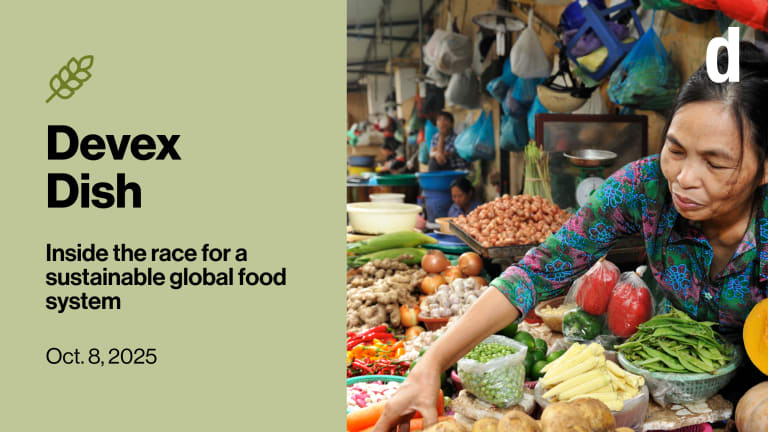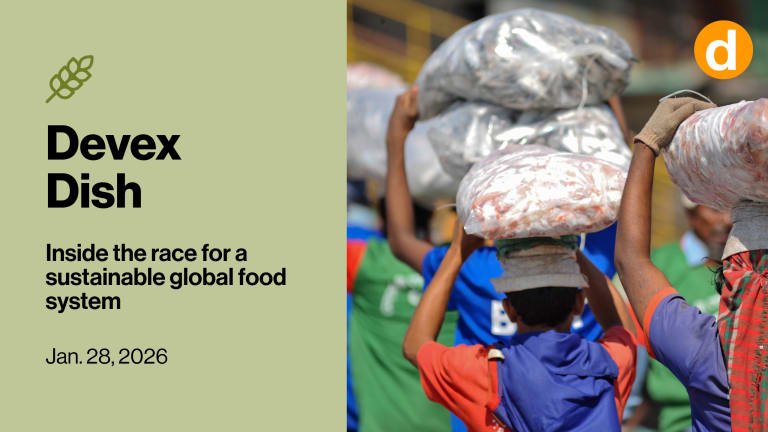
Greetings, Dish readers! This week’s edition comes to you from the United Nations compound in leafy northern Nairobi, where CGIAR’s long-anticipated Science Week is underway — nearly a year after it was postponed due to anti-tax increase, youth-led protests in Kenya.
Organizers had anticipated a similar turnout to last year’s canceled event, which saw around 3,000 registrants. Instead, more than 8,000 people showed up — scientists, researchers, NGOs, policymakers, and plenty of students. Indeed, young people continued to take center stage, with lively discussions about how to get more youth into agriculture. I even stood in line next to a recent Kenyan university graduate who hopes to follow in her dad's footsteps in agriculture and was curious about incorporating modern techniques. (We had plenty of time to chat. It took two hours just to register and get our badges.)
The overall mood is upbeat and focused on innovation. Science Week, co-hosted by the Kenyan Agricultural and Livestock Research Organization, has several key goals. It aims to drive research and innovation in agricultural science. Additionally, it seeks to forge partnerships and mobilize investment. Ultimately, the goal is to build sustainable food systems that support food security, economic stability, gender equality, and climate resilience. While there were a few quiet nods to the difficult funding landscape, most conversations centered on unlocking scientific solutions to agricultural challenges — and how to bridge the gap between research and real-world implementation. As African Union Special Envoy for Food Systems Ibrahim Mayaki put it at Monday’s opening plenary: “Science is a mindset that focuses on problem solving.” That’s one reason the continent needs more leaders who are scientists, he said.
That focus on practical solutions carried through to a session on how innovation could build more resilient food systems in conflict-affected settings. Yanyan Liu, a senior research fellow at IFPRI, presented predictive models that can forecast IPC outcomes three to 12 months in advance. “Forecasting food crises using real-time risk factor monitoring is feasible,” she said. By the end of the panel, representatives from the World Food Programme and other groups were lining up with questions — eager to understand how effectively and quickly the tool could be put to use.
Elsewhere on the grounds, CGIAR research centers from around the world displayed their latest innovations in colorful, interactive booths: jars of blight-resistant potato seeds, bags of insect-based chicken feed, samples of locust frass fertilizer, and saplings of soil-protecting waterberry trees that looked right at home in the compound’s lush green surroundings.
At one session hosted Tuesday night by the Ban Ki-moon Centre for Global Citizens, a roomful of young “agri-champs” shared their stories — including Eliud Rugut, who, a decade ago, convinced his father to let him take over a single acre of land. He installed a drip irrigation system, boosted productivity and income, and quickly proved the value of modern techniques. That early success pushed Rugut toward full-time agri-entrepreneurship. Today, he runs Silo Africa, a grain storage and logistics startup company focused on smart silos that help reduce post-harvest losses — with over 6,000 farmers now participating.
Farmers are willing to adapt to new technologies and approaches, Rugut said. “You just have to show them what’s possible.”
+ Are you at Science Week and want to chat? Send me a note at ayenat.mersie@devex.com to say hi!
Recipe for disaster
In a Friday night email obtained by Devex, Peter Marocco, director of the State Department’s Office of Foreign Assistance, flagged urgent pressure from the White House: “I’m fielding [White House] calls on whether we’ve complied yet with the President’s order to stop all payments to Afghanistan.” Within hours, terminations began — and by the end of the weekend, 42 USAID programs were abruptly canceled, totaling $1.3 billion across countries including Afghanistan, Gaza, Yemen, Syria, and Haiti.
WFP alone saw $804.4 million in cuts across 14 countries. Six of those terminations might now be reversed, per a Monday email from Jeremy Lewin, a member of Elon Musk’s Department of Government Efficiency, who is also USAID’s new deputy administrator for policy and programs. “If implemented, this could amount to a death sentence for millions of people facing extreme hunger and starvation,” WFP wrote on the social media site X.
Many of these programs had been marked as safe just days earlier. A 281-page list of retained and terminated USAID awards was shared with Congress late last month, giving implementing partners hope their funding was secure. But inside USAID, confusion reigned. “As we all continue to look for rationale or logic ... it’s clear there is none,” one aid worker in the Bureau for Humanitarian Assistance tells Devex. Some programs had been canceled, reinstated, and canceled again.
Indeed, the leaked document showed a broad sweep — and I analyzed it to see how food systems funding fared. Many agriculture and food programs were slated for termination, including all USAID-funded work at the Food and Agriculture Organization. UNICEF saw 36 awards slashed — a major blow, given the United States is the largest donor to both agencies, contributing roughly 14% of FAO’s and nearly 16% of UNICEF’s budgets.
Furthermore, NGOs such as FHI 360 and Helen Keller Intl lost large-scale nutrition programs, and contractors including Chemonics and DAI were among the hardest hit in dollar terms. Projects tied to the Famine Early Warning Systems Network, or FEWS NET, appeared on both the terminated and retained lists — leaving its future up in the air.
All of the datasets in question — the terminated programs, the retained programs, the first-retained-and-later-terminated programs — seem to contain at least some level of inaccuracy or error. So take the findings with a pinch of salt. But for the organizations caught in the middle, it’s less a data glitch and more a recipe for disaster.
Read: A ‘death sentence for millions’ as US cuts more aid
See also: Which USAID-funded food and agriculture programs were cut? Which remain? (Pro)
+ Not yet a Devex Pro member? Start your 15-day free trial today to access all our expert analyses, insider insights, funding data, events, and more. Check out all the exclusive content available to you.
Beware of superbugs
Drug-resistant infections aren’t just a hospital problem — they’re becoming a food systems crisis too. As U.S. foreign aid cuts take hold, experts are warning that efforts to curb antimicrobial resistance, or AMR, are being severely undermined, with major consequences for both health and agriculture.
Until recently, USAID was a key funder of the FAO’s Global Health Security Programme, which worked in countries such as Ethiopia to reduce antibiotic use on farms, improve surveillance, and strengthen infection prevention. “We are not really supporting the farmers or the producers on biosecurity,” says Kuastros Belaynehe, an Ethiopian AMR expert and former FAO staffer. “So their farms will be really prone to disease.”
Before it was shut down, the program had begun showing results — including a measurable drop in the use of certain antimicrobials. Without continued investment, Belaynehe warns that resistance will rise, treatment will become harder, and food prices could climb.
Cuts to U.S. funding don’t just weaken health responses — they also roll back prevention efforts in agriculture, where overuse of antibiotics can accelerate resistance and strain food systems.
Read: Could US foreign aid cuts fuel a superbug crisis?
Background reading: AMR in livestock could threaten food security for 2 billion by 2030
Put it all in the blender
Blended finance isn’t new, but it’s still underused when it comes to improving global nutrition. And with foreign aid budgets shrinking, making the most of every dollar — and partnership — matters more than ever.
In an opinion piece for Devex, economist Peter Beez of SDC, Greg S Garrett of the Access to Nutrition initiative, and Lucas Tschan of iGravity argue that combining public, private, and philanthropic resources — and perspectives — could help fill critical funding gaps in food systems.
Their commentary comes on the heels of the Nutrition for Growth summit in Paris, where ATNi co-hosted a separate summit focused on mobilizing the private sector — including major food companies — for nutrition. In the opinion piece, the writers highlight how each sector has a role to play. SDC helps de-risk investments and drive impact through tools like outcome-based financing. ATNi provides free technical assistance and nutrition performance data to guide investors. And iGravity structures blended finance deals that reward measurable impact — like their work with Kenyan food enterprise Kwanza Tukule.
This kind of approach, the authors argue, could unlock billions of extra dollars — and translate into better nutrition outcomes for millions of people.
Opinion: To scale nutrition outcomes, blend finance and perspectives
Bringing home the bacon
Senior Director, Monitoring, Evaluation, Accountability, and Learning (MEAL)
Feed the Children
U.S. and multiple countries in Africa (remote)
Chew on this
Nutrition International released its principles of engagement with the ultra-processed food industry. [Nutrition International]
‘I bought their dream': How a U.S. company’s huge land deal in Senegal went bust. [Associated Press]
The Bezos Earth Fund is investing $19.3 million and the Global Methane Hub is contributing $8.1 million to efforts aimed at reducing methane emissions from livestock. [Bezos Earth Fund]








